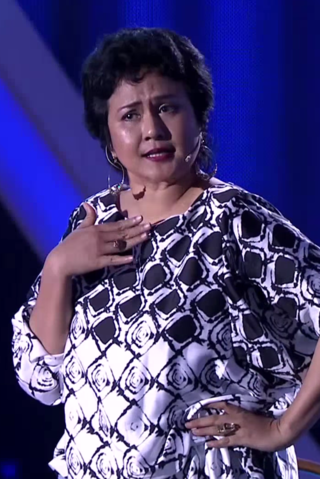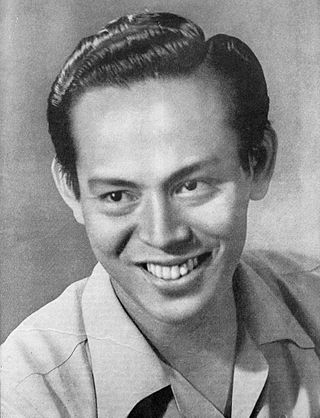
Sri Sultan Hamengkubuwono IX, often abbreviated as HB IX, was an Indonesian politician and Javanese royal who was the second vice president of Indonesia, the ninth sultan of Yogyakarta, and the first governor of the Special Region of Yogyakarta. Hamengkubuwono IX was also the chairman of the first National Scout Movement Quarter and was known as the Father of the Indonesian Scouts.

Jaka Sembung is a 1981 Indonesian fantasy martial arts film, based on a character of the same name on a comic book by Djair.

Usmar Ismail was an Indonesian film director, author, journalist and revolutionary of Minangkabau descent. He is widely regarded as the native Indonesian pioneer of the cinema of Indonesia.

Si Buta Lawan Jaka Sembung is a 1983 Indonesian fantastique martial arts movie and a sequel to 1981 film Jaka Sembung.

Rano Karno is an Indonesian actor and politician who served as Governor of Banten from 2014 to 2017. As a result of his fame gained from his acting career, he is known for starring in the 1979 film Gita Cinta dari SMA.

Relations between Indonesia and Palestine have been very close and friendly. Indonesia has refused to recognize the State of Israel until a peace agreement is reached between Israel and the State of Palestine. Indonesia has strongly stood up for the rights and freedoms of the Palestinians and has supported the struggles of the Palestinians.

Lewat Djam Malam is a 1954 Indonesian film directed and produced by Usmar Ismail and written by Asrul Sani. Widely regarded as a classic of Indonesian cinema, the film follows an ex-soldier in his vigilante actions against corruption.

Tjambuk Api is a 1958 Indonesian martial arts film directed by D. Djajakusuma and produced by Usmar Ismail. Starring Bambang Irawan, Aminah Cendrakasih, Soekarno M. Noer, and Rendra Karno, it tells of a young villager who must challenge a local criminal to be with his love. The film underwent several modifications over a period of more than a year before it could pass the censorship board, but now remains one of Djajakusuma's better known works.
The 2nd Moscow International Film Festival was held from 9 to 23 July 1961. The Grand Prix was shared between the Japanese film The Naked Island directed by Kaneto Shindo and the Soviet film Clear Skies directed by Grigori Chukhrai.

Rara Patma Dewi Tjitrohadiseikusumo, best known under her stage name Chitra Dewi, was an Indonesian actress and director. She was noted for her roles in Usmar Ismail's films of the 1950s, appearing in films such as Tamu Agung, Tiga Dara, and Pedjuang, although she remained active in cinema until 1993 and won a Citra Award for Best Supporting Actress at the 1979 Indonesian Film Festival for Gara-gara Isteri Muda. Dewi also had a brief stint film directing in 1971, making her one of only six Indonesian women to direct a film before 1998.

Chandra Ariati Dewi "Ria" Irawan was an Indonesian actress and singer of Minangkabau descent.

Raden Soekarno, better known as Rendra Karno, was an Indonesian actor. Born in Kutoarjo, Central Java, Soekarno entered the film industry in 1941, making his debut appearance in Union Films' Soeara Berbisa. Over the next forty years he appeared in more than fifty films. He was also involved in the theatre during the Japanese occupation of the Dutch East Indies and the Indonesian National Revolution. For his role in 1962's Bajangan di Waktu Fadjar, he was named best supporting actor at the 1963 Asian Film Festival in Tokyo.

Eliza Firmansjah Noor, better known as Lies Noor, was an Indonesian actress and model. Rising to popularity after her appearance in 1952's Pulang (Homecoming), directed by Basuki Effendy, by 1955 Noor was able to demand fees of Rp 10,000 for her film appearances.

Tiga Dara is a 1957 Indonesian musical drama film starring Chitra Dewi, Mieke Wijaya, and Indriati Iskak. Directed by Usmar Ismail for Perfini, the film follows three sisters who live with their father and grandmother. When the eldest sister, Nunung, shows no interest in marrying, her family tries unsuccessfully to find a husband for her. Nunung initially rejects the advances of a young man named Toto, who instead dates her younger sister. However, when he becomes jealous and travels from Jakarta to Bandung to profess his love, she agrees to marry him.

Frieda Thenu, better known by the stage name Farida Arriany, also known as Frieda Shagniarty, was an Indonesian actress, model, and singer. She was named the most successful Indonesian film star in 1960s.
Singgasana Brama Kumbara is an Indonesian historical-drama television series, produced by PT. Menaragading Citraperkasa. It is an adaptation of a popular radio series called "Saur Sepuh" with some changes in the plot. It was first aired on ANTV on March 4, 1995.

Rajuan Alam is a 1956 semi-documentary directed by Miriam Bucher and starring Bambang Hermanto and Lies Noor.
24 Hours with Gaspar is a 2023 Indonesian crime drama film directed by Yosep Anggi Noen, based on the 2017 novel of the same name by Sabda Armandio. The film stars Reza Rahadian as the titular character, a detective who investigates the mysterious disappearance of his childhood friend in the last day of his life.














